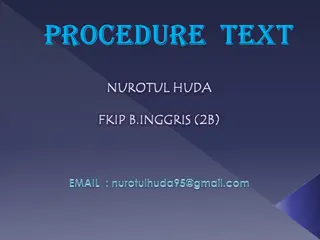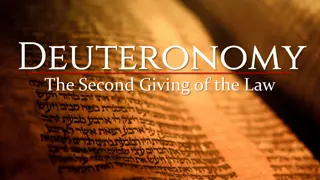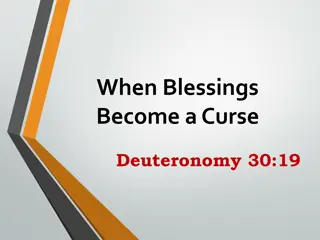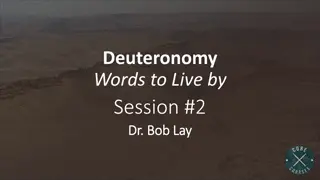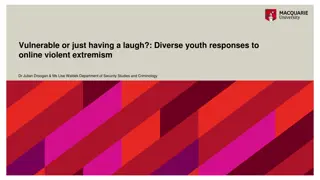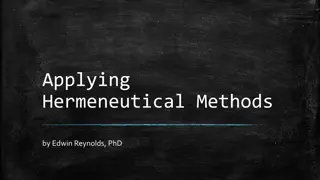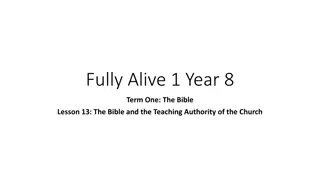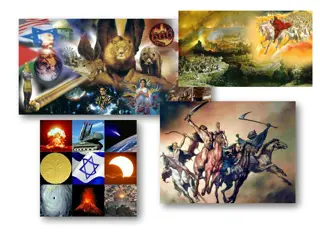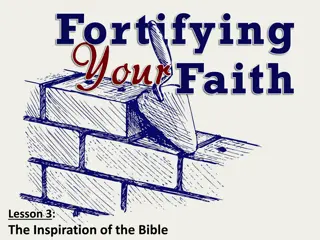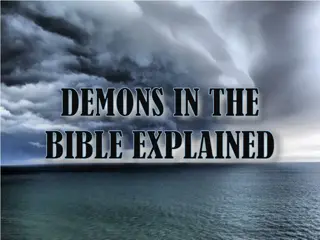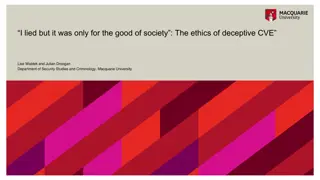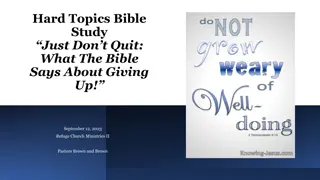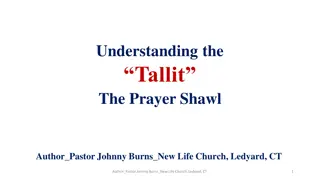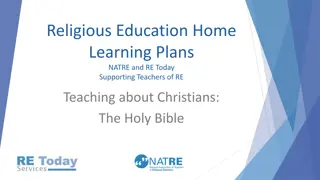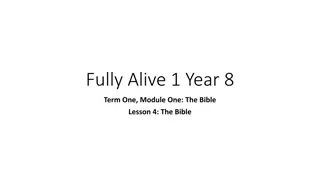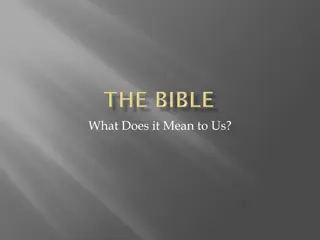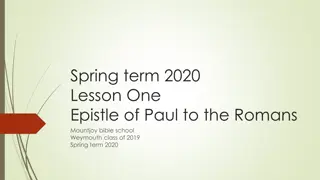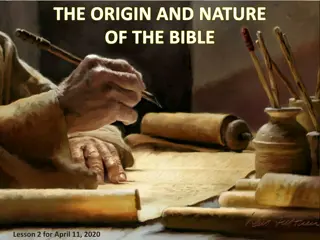Contemplating Violent Texts in the Bible: Insights from Deuteronomy
In the Bible, violent acts are attributed to the will of God, both through supernatural and human means. Dr. Emanuel Gerrit Singgih explores the presence of violence in the Scripture, specifically focusing on the term "kherem" in the book of Deuteronomy. By examining these texts, the article sheds light on interpreting violent passages for a deeper understanding rather than disregarding or misusing them.
Download Presentation

Please find below an Image/Link to download the presentation.
The content on the website is provided AS IS for your information and personal use only. It may not be sold, licensed, or shared on other websites without obtaining consent from the author. Download presentation by click this link. If you encounter any issues during the download, it is possible that the publisher has removed the file from their server.
E N D
Presentation Transcript
by Emanuel Gerrit Singgih, professor of Biblical Hermeneutics at the Theological Faculty, Duta Wacana Christian University, Yogyakarta, Indonesia.
In the Bible there are many texts which refer to violence, either violence directed to the people of God, or violence from the people of God toward others. The first is regarded as negative, but the second is positive. Not infrequently, violence which was done to others is a realization of the will of God. Violence is willed by God, and caused by either supernatural or natural means (sudden deaths, lightning strikes, natural disasters), but also through the hands of the people of God, i.e. wars. Often it is not clear whether the violence is really acted or imagined in the form of threats.
In every-day life and in Sunday sermons, the congregations are not aware of these texts, as the emphasis is on the love of God, embodied by the person and act of Jesus Christ. In commentaries (Ind: buku-buku tafsir ) reference to violence done to others by the people of God and in accordance to the will of God is usually absent. It could be the result of absent-mindedness, but could also be done expressly, so that the readers will not use these texts to legitimize their violent acts toward others (remembering the bitter experience of communal conflicts in Eastern Indonesia 1999-2002).
But that is not a good way of overcoming the impact of violent texts from the Scripture. In this occasion I will refer to one book in the Bible, namely the book of Deuteronomy in the Old Testament. In the end I will give some thoughts of how to read violent texts, not in order to get rid of them, or to use them as legitimizing violence, or even re-reading them, but to come to terms with them.
In the book of Deuteronomy you will find the term kherem, which appears six times (in Deut. 2:34-35; 3:6-7; 7:2; 7:26; 13:16-18 and 20:16-17, see NRSV). In Deut. 2:34-35 the context is Moses reminiscing about the past, when the people of God conquered the realm of king Sihon of Hesybon. At that time we captured all his towns, and in each town we utterly destroyed men, women and children. We left not a single survivor (Deut. 2:34). The word translated destroyed is kherem.
. In Deut. 3:6-7 the context is the war of Israel against Og, the king of Basan. The two armies clashed in the valley of Edrei. Because God handed over the enemy to the people of God, they were victorious. Again, Moses reminisced: And we utterly destroyed them, as we had done to king Sihon of Hesybon, in each city destroying men, women and children (Deut. 3:6). As in Deut. 2:34, kherem is translated as destroyed .
In Deut. 7:2, the people of God has defeated all the nations, which were more numerous and stronger than them. There is a list of them in Deut. 7:1: the Hittites, the Girgashites, the Amorites, the Canaanites, the Perrizivites, the Hivites, and the Jebusites. Because God has delivered them to the hands of Israel, they have to be utterly destroyed (put into kherem) . In Deut. 7:26, the promise of blessing is given to Israel under the condition that they utterly destroyed their enemies. If they fail to do so, Israel themselves shall be destroyed (put into kherem).
Deut. 13:16-18 is also about the failure to destroy the enemies, who enticed the people to go after alien gods. If this happens then all inhabitant of the city have to be put to death, and all their belongings and the city itself have to be set afire as a sacrifice to God. In the book of Leviticus 1:1-17 and 6:8-13 we read about animals (oxen, sheep/goats, pigeons) as burnt- sacrifices (Hebr: olah), but here in this context, kherem can also be seen as a kind of sacrifice.
The context of Deut. 20:16-17 is about the consequences of war-convention. If the army of Israel approaches a city which belongs to the enemy, then they must offer peace to the city, if they surrender. If not, then all the males should be put to death, while the women, the children, the cattle and all the other belongings are to be considered as war-booty. This convention holds for cities far away from Canaan. But concerning the cities of Canaan, you must not let anything that breathes remain alive. You shall annihilate them the Hittites and the Amorites, the Canaanites and the Perrizivites, the Hivites and the Jebusites - just as the Lord your God has commanded (Deut. 20:17). The word translated annihilate is kherem.
Why are the inhabitants of Canaan to be put into kherem? First, because Israel believed that the land of Canaan is the realization of the promise of God to the ancestors of Israel. It is their land, regardless of the fact that the land of Canaan was already inhabited by many tribes before the arrival of the Israelites. It is a matter of space. Second, because the land is a holy land. The people of God are holy (Deut. 7:6) and because they are holy, they need a holy land. If there are others in the land, then the holiness of the land will be contaminated. Fear of contamination gives rise to violence. It is a matter of sacred space.
As I have referred above, in the commentaries reference to violence is usually absent. That is also the case with the book of Deuteronomy. But I think we should acknowledge that the kherem texts are there, and that they are violent texts. That is the dark side of our Sacred Scripture. This is what I mean by coming to terms with the violent texts. But we do not need to set aside the Bible, just because there are violent texts in them.
There are also many good things in the texts of the Bible (and in the Bible which consists of thousands of texts!). This is the bright side of our Sacred Scripture. We have admonitions to go to war, but we have also longings for peace, where swords shall be remade to become plowshares, spears into pruning hooks, and where nations shall not lift up sword against nation, and neither shall they learn war anymore (Is. 2:4).
After coming to terms with violent texts, we ought to look closely at the narrative, following hermeneutics of Ricoeur, by looking for surplus of meaning in the texts, and following hermeneutics of Derrida, by looking for gaps in the texts. The list of nations in Deut. 20:17 is different from Deut. 7:2 above. Here the Girgashites are omitted from the list. Maybe it is a slip, but we can imagine how the Girgashites feel when they discovered that they are not in the death-list.
In the book of Joshua chapter 9 and 10 there is reference to the Gibeonites, who are not in the list above, but they also belong to the nations of the land. They survived Joshua s wars of conquest because they cheated Joshua with cunning diplomacy so that they cannot be annihilated. But they avoid the fate of the other nations by living as second class citizens, becoming wood-cutters and water-carriers for the community and for the altar of God, to this day (Josh. 9:27).
In both the lists, the Jebusites are included to be exterminated, but in other parts of the Old Testament, they are alive and well, and they live with the people of Judah in Jerusalem to this day (Josh. 15:63; Judg. 15:63). Later, when David became king, Jerusalem was a Jebusite city. He conquered the city, but there is no reference to kherem. It could be that David thought better of it, and instead of exterminating them, he made them his subjects (II Samuel 5:6-10).
In the context of the third passage on kherem, in Deut. 7:3, there is a prohibition for the Israelites not to intermarry with the nations, or giving their daughters to the people of the land. In Deut. 7:4 the reason of this prohibition is that the people of the land will draw away their sons from God, and this will make God angry and put the Israelites to kherem. It means that they were still there after the Israelites settled down, and there was a lively communication between the two communities, at least among the young generation.
In Deut. 7:26, the Israelites are obliged to exterminate (kherem) the nations, but in the same passage it is stated that God will drive out the nations little by little, and that the Israelites will not exterminate them quickly, for fear that the wild beasts will become too numerous for them (Deut. 7:22). What a strange explanation! Can it be that in practice, the kherem is not as dreadful as in the narrative?
Because of the discrepancies above, experts of the Old Testament think that the kherem is never actually practiced. John Collins argued that the texts of Deuteronomy does not represent the reality of the conquest, as it was composed long after the time of Moses, and the form of the narrative is reminiscences of Moses. It is actually the reminiscences of the composers or editors who imagined the past by remembering the ancient practice of kherem: when Israel entered the land, it is clean, as the former inhabitants were all put to death. Neither is the kherem a common practice in the Ancient Near East. According to Brekelmans, it is only practiced by the people of Moab (Israel s neighbor), as can be seen on the Moabite Stone from the ninth century BCE.
If so, then the violence happens not in history, but in the mind of biblical writers. However, it does not disentangle us from the problem, as it is from their writings that we come to know their minds. Their writings are preserved until the present time, and become problematic for us, both in the East and in the West, whose understanding of justice and fairness is different from the biblical writers.
We stumble on these violent texts, but it is a good thing that we stumble, because it may make us humble, to realize that we are not as righteous as we think we are. It also reminds us that we live in a different context, and do not want to bring the past into the present, by condoning ethnic-religious cleansing.
Source: Emanuel Gerrit Singgih, Kherem in the book of Deuteronomy: God, War and Violence in the Old Testament , in Carl Sterkens, Muhammad Machasin, Frans Wijsen (eds.), Religion, Civil Society and Conflict in Indonesia, Z rich-Berlin: LIT Verlag, 2009, 41-57; Emanuel Gerrit Singgih, Memaknai Ulang Teks-Teks Kekerasan dalam Kitab Suci ( Re-reading Violent Texts in Sacred Scriptures ), unpublished paper.


